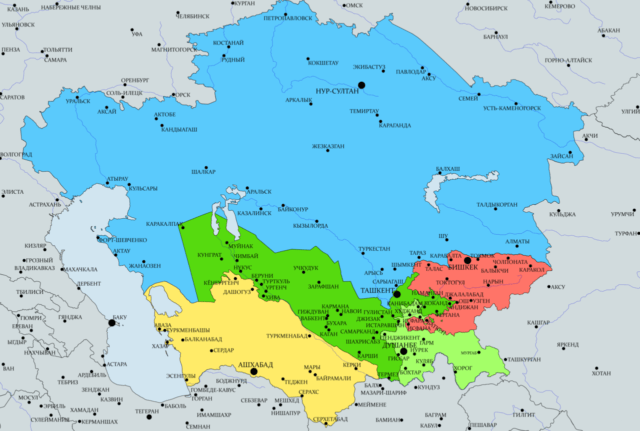“Central Asia – Russia” summit confirmed economic cooperation and Kremlin’s regional influence

Geopolitical Report ISSN 2785-2598 Volume 24 Issue 5
Author: Giuliano Bifolchi
The first “Central Asia-Russia” summit in Astana confirmed the Russian importance in the region and the Kremlin’s strategy to increase economic cooperation with Central Asian republics.
On October 14th, 2022, Astana hosted the first “Central Asia – Russia” summit attended by Russian President Vladimir Putin, Kazakh President Kassym-Jomart Tokayev, Uzbek President Shavkat Mirziyoyev, Turkmen President Serdar Berdimuhamedov, Tajik President Emomali Rahmon and Kyrgyz President Sadyr Japarov. The leaders agreed to intensify and deepen economic contacts between their countries and emphasised the importance of cooperation on a mutually beneficial basis.
According to the final text signed by the participants at the end of the summit, economic cooperation between Russia and Central Asia plays a fundamental role for the stable development of states, the growth of economic complexes in all areas and the reduction of social risks. The parties “intend to further strengthen their economic cooperation on a mutually beneficial basis by promoting the growth and diversification of mutual trade, expanding industrial cooperation in promising sectors of production, intensifying investment cooperation, including using the potential of regional integration associations”.
In the future, Russia and Central Asian republics will work on implementing joint projects to develop priority areas in the economy. They also agreed to expand settlements in national currencies and promote cooperation between the Russian regions and the regions of the Central Asian countries.
In addition, the leaders agreed to take measures to prevent the incitement of hatred on national, historical, cultural, linguistic or religious grounds.
During his speech, the Russian President stated that Russia is ready to provide practical assistance in restoring the unified energy system of Central Asia. Putin stressed that the Russian Federation and Central Asian republics might jointly work to realise energy infrastructures, such as nuclear power plants, and introduce digital technologies.
According to Putin, prospects are also opening in areas such as expanding oil transportation routes and joint development of energy resources in the Caspian Sea, providing affordable and clean gas motor fuel, building and expanding pipelines, increasing coal trade, and transporting it to Asian markets.
Russia needs to control its blizhnee zarubezhe
The summit highlighted the vital role that Central Asia has in Russian foreign policy. Indeed, the Kremlin considers Central Asia as a fundamental part of its blizhnee zarubezhe (near abroad) and lebensraum (vital space), where Moscow has attempted since the collapse of the Soviet Union to restore its political influence and military and economic presence.
Russian President Vladimir Putin discussed new trans-Eurasian corridors East-West, North-South, and the Europe-Western China route during the summit. Central Asia has a strategic role in this framework and might become a logistic hub by connecting Europe, Asia, and Russia with Southeast Asia.
Considering the current situation that the Russian Federation is experiencing after the beginning of the Ukraine conflict and the imposition of Western sanctions against Moscow, the Kremlin needs to maintain its grip on Central Asia, avoiding external interferences, regional conflicts, or political crises.
To avoid internal problems, Putin met with Tajik President Emomali Rahmon and Kyrgyz President Sadyr Japarov to discuss borders problems and guarantee regional stability and security after the military escalation between Tajik and Kyrgyz security forces occurred in September 2022, which caused death among civilians and military personnel. Commenting on his meeting with the leaders of Tajikistan and Kyrgyzstan, Putin described it as “constructive”. Indeed, the parties agreed to do everything possible to avoid the resumption of hostilities.
Putin’s meeting with Rahmon and Japarov might also smooth out the rumours about internal problems in the Collective Security Treaty Organisation (CSTO) after both Kyrgyzstan and Armenia decided not to participate in the military exercises Frontier-2022.
Conclusion
After the U.N. General Assembly voted against the referendum held in Donetsk, Lugansk, Kherson and Zaporizhye region, which established the annexation to the Russian Federation, the Russian Federation needed a positive signal in the field of international relations and foreign policy.
During Russian Energy Week 2022, Vladimir Putin announced the possibility that Russia could create in Turkey the largest natural gas in Europe moving. On October 12th, 2022, the Russian President discussed this issue with Turkish President Tayyip Recep Erdogan, who announced that an international gas hub would be created in the European part of the country as soon as possible. This prospect might represent a valid alternative for the Russian Federation to the North Stream-2, open new transport and export routes for Russian natural gas, and expand the Kremlin’s business partners in the energy market.
Another positive signal came from the first “Central Asia – Russia” summit of Astana, where Russia confirmed its role in the region and created the basis to expand economic cooperation in different fields, especially in the energy market.
Although in the last months many international media stressed that Moscow was losing its influence and grip on Central Asia, particularly in Kazakhstan, today’s summit might have shown a different regional reality.
Indeed, after many rumours, Tokayev’s Kazakhstan, which had increasingly looked to the European Union and China, appears to have returned to the Kremlin’s orbit through a series of bilateral cooperation agreements.
While the Kremlin has yet to resolve internal problems within the CSTO and the Eurasian Economic Union and needs to understand to what extent China can be a reliable partner in Central Asia or a competitor, today’s summit may have once again confirmed Russia’s regional leadership by providing Moscow with a key area of influence in the global logistics, transport and energy landscape.
